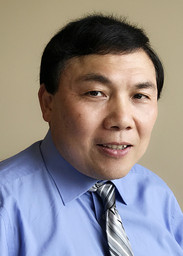| Professor Yun Hang Hu |
| Thu 14 Jun 2018, 11:00 - 12:00 |
| LT1, Sanderson Building |
If you have a question about this talk, please contact: Francisco Garcia Garcia (fgarcia2)

Highly Efficient Visible Light Photocatalysis for Hydrogen Production and CO2 Conversion
Abstract:
The electrochemical photolysis of water on TiO2 electrodes was discovered in 1972, which created a new era in heterogeneous photocatalysis. However, it is still a challenge to use visible light for photocatalytic processes. In this seminar talk, Prof. Hu will highlight the efforts and findings in his group, with emphasis on (1) why the absorbed visible light by a photocatalyst makes negligible contribution to a photocatalytic process and (2) how to solve such an issue. Furthermore, two efficient visible light photocatalytic processes will be discussed: (1) hydrogen production from water and (2) CO2 reforming of methane.
Bio:
Dr. Yun Hang Hu is the Charles and Carroll McArthur Endowed Chair Professor at Michigan Technological University and Chunshen Chair Professor at Shanghai Jiao Tong University. He is a fellow of American Association for the Advancement of Science (AAAS), a fellow of American Institute of Chemical Engineers (AIChE), and a fellow of Royal Society of Chemistry (RSC). He was elected as the chair of the Energy and Fuels Division of the American Chemical Society (ACS) in 2014 and the president of the Hydrogen Storage Division of International Association of Hydrogen Energy (IAHE) in 2015. He is an editor for four ACS series books and an editorial board member for 9 international journals, including Scientific Reports (2012-present), J. Mater. Chem. A (2012-2017), ACS Energy Letters (2018-present), Catalysis Today (2012-present), Int. J. Energy Res. (2012-present), and Energy Sci. Eng. (2017-present). He gave more than 100 invited talks to international conferences, universities, and research centers. He received his Ph. D. in physical chemistry from Xiamen University in China. His main research interests range from nanomaterials, clean fuels, hydrogen storage materials, CO2 conversion, catalysis, quantum chemistry calculations to solar energy. He has published near 200 papers in prestigious journals.


